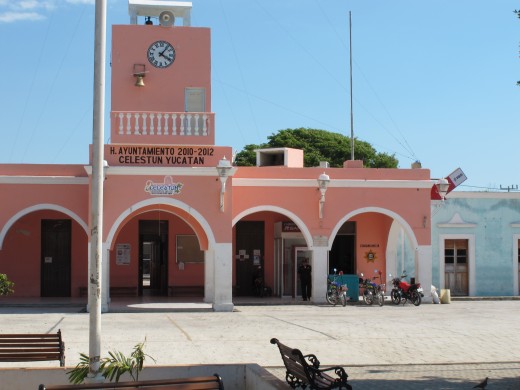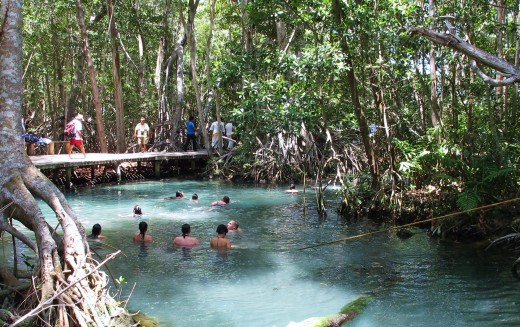Foreign Language Immersion Schools - Do They Work?
Learn a Foreign Language in Another Country

What are Language Immersion Courses?
Have you wanted to learn a foreign language, but you feel like your school days are over? Not true; people of all ages enroll in Language Immersion courses, where they get to travel and have fun while they're learning.
Language Immersion Programs work by creating environments where (ideally) the student literally lives the language 24-hours-a-day. You travel to a foreign country, live with a family that speaks the language and take courses to learn the structure and grammar of the language.
These programs DO work, and they're considered among the best ways to quickly and thoroughly learn a second (or third!) language.
If you're thinking of taking an immersion course, you will want to pick your school and location wisely and plan ahead so you'll enjoy the experience and get the most out of it.
First, do your research! Decide which language you want to learn (or to advance in, if you've got some skills already). Then to an online search for "French Immersion," "Spanish Immersion," or whatever language interests you. Read as much as you can about each school as well as the location, the home-stay options and any feedback that's been posted by previous students. At first you will be overwhelmed by the number of schools and locations to choose from. Here are some tips to help you narrow your search:
Learn Spanish in Places like Costa Rica, Mexico, or other Latin Countries

Which Foreign Language Should You Learn?
If you've already narrowed your choice of languages, you're ahead of the game. But if you simply want to learn another language and haven't decided which one to tackle, give some thought to what choice will be best for you.
- Do you need another language for business? If your work exposes you to people of another culture, or if you travel to foreign countries, picking a language that will help you better communicate. If you're exposed to more than one culture, perhaps focus on the language in the culture you're most often around.
- Will this goal help your education? If so, be sure to pick a language that will transfer to your college or university. Does the school offer transcripts, and are they accepted back home?
- What languages have you studied before? If you already have a few years of French, maybe you can become completely fluent with several weeks of immersion courses.
- Do you live near people who speak other languages? If you're in a community with a large population of non-English speakers, learning the language of your new neighbors can help you socially as well as professionally.
- What are your travel goals? If you plan to travel to other countries, you might enjoy learning a language you can use on your future trips.
Learn History, Culture and Language through Immersion Schools


How Much Language Training is Needed to Be Fluent?
Select your school and the length of time based on your goals for fluency and the level of fluency you want to attain.
Do you want to be completely fluent?
- Look into schools that are affiliated with academic institutions and that offer transfer credit. These schools are likely to offer more rigorous courses and to focus on grammar structure instead of or in addition to conversational skills.
- Consider going for at least three months, if your schedule and budget permits. While you can certainly learn a lot in just a week or two, it won't take you where you want to go in terms of fluency.
- Look for a school in an area with a high ratio of native speakers. It might be tempting to attend that cool school near the beach, but you will be better served by attending a school less likely to attract people more interested in tourism than academics.
Is your goal to brush up on conversational skills?
- Pick a school that offers 'conversational-level' courses. You can also find schools that specialize in courses for certain professions, such as medical immersion courses.
- Look for a school near the geographic area where you might travel. This will help you learn the pronunciations or idioms you'll find when you visit for vacations.
- You can learn quite a bit in just one week, and even more if you stay several weeks. Conversational skills lend themselves well to shorter immersion programs.
Merida, Mexico has Several Language Immersion Programs

Tips for Picking a Language Immersion School and Location
- Look for a Good Fit: If your goal is serious learning, decide whether a school near a beach is a good fit or not. Often, schools with advertising focused on their beautiful recreational setting may have a focus on tourism and fun rather than teaching the language. There's nothing wrong with fun, but if you're in a class with people who can't wait to get to the beach, you'll have a different academic environment than if you're in a group of serious learners.
- Travel Time and Expense: How easy will it be to get there, or to take a side trip after you're there? If you're on a tight schedule, with only a week or two, be realistic about the time it will take to reach your destination or to go to other sites while you're there. While at an immersion school in Merida Mexico recently (I was there for seven weeks), I traveled to a nearby beach, saw a flamingo habitat in Celestun and visited some ruins.
- Demographics of Other Students: Take note of the ages of students on the school's website. If you're well into your career years (or even beyond) and the site's photos are all college-aged kids, you might feel out of place. People of all ages study through language immersion and you can easily find a school that fits your personal demographics.
- Compare Prices! You are likely to see a wide range of costs for basic tuition and room & board. While the cheapest may not be the best choice (for many reasons - more on that in a bit), high-dollar schools may be over priced. You can get a good value for your money if you research correctly.
- How Qualified are the Instructors? Check the qualifications of the instructors. A good school should list its own credentials as well as those of the instructors. If the school's website is vague on those details (but perhaps emphasizes scuba diving or other fun stuff), keep looking.
- Can You Transfer Credits? Will the course transfer for college credit? Many immersion schools partner with various colleges and universities to give academic credit for their coursework. If this is the case, you'll get a document when you leave the course that lists the credit hours of study and the level you attained.
- Check for Safety Issues: Consider safety issues. Some countries (Mexico, for example) have had issues with crime in recent years. When you've found a school that interests you, research the specific city you'll be in, contact the consulate office in the U.S. to ask questions, and read any news articles you can find. I had no problems in Merida during my entire stay, but I researched it thoroughly before I went and I talked to the director of the school by phone before going. Some lower-priced schools in remote areas might offer attractive rates, but you'll need to check on crime statistics before you make your decision.
- Home Stay Issues: Carefully consider your "home stay" preferences before enrolling. How comfortable will you be if there are pets or small children? If the home takes in other students, will you be around students who revert to their native language (English, for example) rather than sticking to the immersion plan? You should be able to indicate diet preferences and other details to make your stay more comfortable.
- Check Curriculum and Tutoring Options: Review the curriculum and private tutoring options. If you already know some of the language, maybe you can stick to the basic hours-per-week program (usually four hours a day; 20 per week total). Can you afford some private classes? If so, that can greatly help you advance and tackle grammar obstacles or challenges.
- Have Fun! Plan to balance the learning with some fun, but don't go overboard. If you're thinking of going with a group, beware of the 'tour director' syndrome, where the person organizing the trip plans all the side excursions and pre-plans every free minute for the entire group. Naturally, you'll want to see the area and have a good time, but don't let that happen at the expense of learning.
Some Language Immersion Schools in Various Countries
- Institute of Modern Spanish: Spanish schools in Merida, Yucatan, Mexico. Spanish schools in Mexico.
Spanish schools Merida Yucatan Mexico founded in 1995 Spanish programs Mexico and Maya cultural classes. Excursions to Mayan ruins. Family Homestay. Study in Mexico with true language immersion Spanish language schools Merida. - Coeur de France - French Immersion : Home
- Spanish Immersion, Spanish Language Immersion, on the ocean in safe and Exciting Veracruz -- Spanish
Study, Learn, Speak Spanish in safe and exciting Veracruz at The Language Immersion School. Non-traditional, highly successful, immersion emphasizes speaking and listening, and includes culture, adventure, and ecotourism to make learning more interes
What about you?
Have you ever attended a Language Immersion School?
Have Fun While You Learn!
Language immersion certainly isn't all work and no play. Be sure to take advantage of side excursions, day trips, or weekend jaunts to nearby sites. During your downtime, visit area museums, check out festivals or events, enjoy the local cuisine, and practice your new language!
Many schools offer additional courses in cooking, cultural and historic facts and traditions and various sports activities.
Consider side trips before and after your time at the school. This maximizes your investment in travel times and expense, and if you tour an area in which the language you're learning is spoken, it will enhance your fluences.








